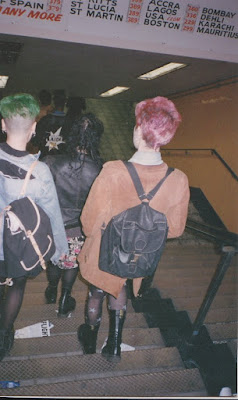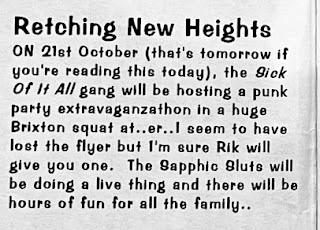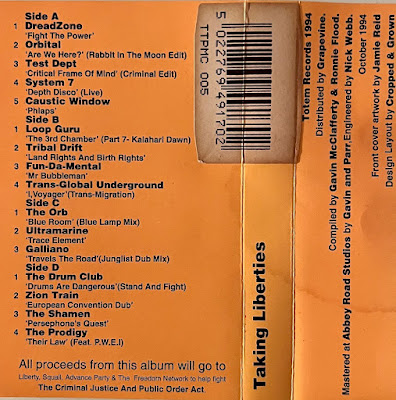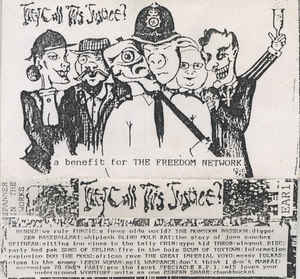Outwrite
'The best thing about this time was that I used to work as a volunteer on this newspaper called Outwrite, a feminist paper which I really admired. It was very lesbian and I was thinking about my sexuality at that point. It was really big on international news, they had a very international collective from all over the globe. I thought it was wonderful, but unfortunately it closed down during that year.
After a year or so I ended up living in Brixton. That was the place for me. For the first time I felt ‘I am at home here’. I really liked it, there was a big alternative profile, a big anarchist scene, a big squatting scene, a big lesbian scene, and suddenly not having a job became a very good thing. I was signing on and realized I had plenty of time to hang out with my friends, drinking tea, yakking on and watching daytime TV but also to do political stuff which I got more into at that time.
Troops Out
I was involved in the Troops Out Movement quite early on when I lived in London. I worked on their magazine, Troops Out. I was also part of organizing an Irish arts exhibition and film festival. The art exhibition we tried to put on through Southwark Council initially and that lovely publication the South London Press ran a front page news splash saying council funds IRA film show and the Council very bravely shut the thing down. We managed to transfer over to Lambeth and had the exhibition in the basement of the recreation centre, not the most accessible high profile place, but we put it on and it did have some really good art work in it. We had a weekend film festival at the Ritzy cinema with various political Irish films, some really good stuff. Some of it was not very subtle but some was much more exploratory – I wouldn’t call it straightforward Irish republicanism but something in that area.
I went on the Troops Out delegation to Belfast and stayed with a family, it was shocking and frightening to find yourself walking past soldiers with their guns. It did feel pretty besieged.
Shocking Pink
I started working on this magazine called Shocking Pink, which at that point had an exhausted collective who really wanted to palm it off on someone else. Me and my friend Vanida took it on to quite a large degree. It was based in squats, and was a young women’s magazine. It was supposed to be an alternative to magazines that were around at the time like Jackie and My Guy which were all about boyfriends and getting your make up right, whereas this was feminist and had a good lesbian profile as well, which definitely was a big pull for our readership. We used to get lots of letters from isolated lesbians from all round the country. They found it a real lifeline when they felt isolated at school and stuff like that.
I really liked that magazine. I liked the way it worked. We had a kind of no-editing policy - if we wanted to put something in we just put it in wholesale. We didn’t put everything in, we were selective about what we put it in, but very open. It meant that we put in heaps of stuff which individuals on the collective might never have agreed with and thought was rubbish, it made it very varied and quite strong for that. It made the collective meetings and collective process of putting it together quite light and quite fun because we weren’t sitting round saying ‘what news issues do we need to cover‘. We were just saying ‘OK what articles have we got typed up on the computer, what cartoons have we got, is this enough to fill a magazine yet?’, and then when it seemed like it had built up quite a lot we’d shove it all together and have these big press weekends. First of all it had to be typeset, which we did late at night in this friendly typesetters’ office. I first started learning typesetting which led ultimately to the layout and subbing work I did later on. I really took to it, I really liked the whole world of newspapers and magazines.
I learnt how to use the typesetting machine, it was a beautiful old machine, very difficult to use and user-unfriendly compared to the DTP that was going to come in a couple of years later but the results were really beautiful. We’d come up with lovely long columns of beautiful quality typeset articles - galleys - ready to stick down in our mad collagey style that we had at Shocking Pink. Then we’d all spend a whole weekend spending 16 hours a day sticking it all together, doing lots of art work round the articles.
It was loads of fun as a collective experience, there were lots of volunteers who’d all come out of the woodwork at that point and join in. Just generally around Shocking Pink it made it into a little gang. There was another woman called Louise who I guess was the third main person in the collective apart from me and Vanida, a lovely person who used to do our music reviews - a good little punk. It was just fun being in a gang. After a new issue came out we’d go round selling it, even selling outside Brixton tube station just like the SWP would with their paper, or else we’d go the easy route and go to lesbian pubs and sell it there because it was easy-peasy selling it as a dyke thing, We’d go on demos with it and flog it. It was such a sort of positive publication it was very easy to promote it, you didn’t feel like you were forcing anything difficult or worthy on people that they are less keen on sometimes.
Shocking Pink’s office shifted from a couple of squats, and we managed to get ourselves a huge big room at the top of 121. We had to fight with one of my flat mates, Alex, who wanted it for Class War but we managed to just swing it by claiming that we should have more women in the building!
The poll tax riot
We went on that really huge anti-poll tax demo [31st March 1990] - it was absolutely vast with about half a million people on it or something like that , the one that turned into a riot in Trafalgar Square. There were lots of little poll tax riots going on all over the country at that point, quite a busy political time with quite an anti-Thatcher focus. We went on that big demo with our stacks of Shocking Pinks, selling it, and it was a mad demo. It had all the lefties and anarchists and all the trot groups but also Tories in big flowery hats, it was a sunny day, it was like people were out for a big picnic partly as well.
And then in Trafalgar Square it just turned into a riot with police horses and people chucking loads of stuff. I’d met up with my poor sister who absolutely hates that sort of thing. Of course I was totally thrilled that there was a riot. We were sitting by some landmark and I would say ‘I’ll see you in ten minutes’ and I’d go and try to riot and chuck things into the crowd. I was a really awful rioter because I couldn’t throw very well so I ended up throwing things on the heads of the people in front of me which was not a lot of help to anybody. I’d do that for a bit and then I’d go back and check on my sister who was completely stressed out about the whole thing, and then I’d go and try and riot very ineffectively a bit more. It was an exciting time when you just felt that a lot was happening and I do personally credit that particular riot with bringing down Thatcher- there’d been lots of riots, but that one was big, there were huge buildings in Trafalgar Square set on fire and it went on well into the night. That was a very good time.
Squatting in Brixton
I moved around loads when I was living in Brixton. Some of the time I was living with these friends right in the middle of Brixton in Rushcroft Road, which felt like quite a crazy place. I lived in this very nice co-op for a while, but everyone was always arguing. Then I moved into a squat for a year and a half - I had the world’s easiest squatting experience, we had electricity and I wasn’t there at the point when they actually opened it up and did all the hard work, I just moved in and said ‘Oh will this be my bedroom then?’, and painted it nice colours! It was quite together it wasn’t one of those disaster squats full of hopeless types, it was quite organized and sensible, it was very sociable and very pleasant.
I really enjoyed squatting, it was very much part of the Brixton anarchist scene, very connected with the 121 bookshop. I lived in a squat in Saltoun Road, then later lived in flat back in Rushcroft Road with Rosanne and Atalanta and about ten pets - cats and dogs.
After a bit I decided that since Shocking Pink was a young women’s magazine I was maybe getting a bit old for it, it was supposed to be for teenagers and I was beyond that so I left.
I was working part time, I’d done a course in typesetting and DTP and started working on TV Quick. I was doing lots of writing, working on my first novel, unpublished to this day!
The Wild Women’s Weekend
I went to the Wild Women’s Weekend [in May 1990], it was in a squatted former council housing benefit office in Brixton, next to the George Canning pub [later Hobgoblin and now Hootenanny] and also unfortunately next to Brixton’s rather anonymous Tory headquarters. It doesn’t have the name on it - they wouldn’t dare, just a bit of blue paint. I think it was them who were instrumental in eventually getting the place shut down. It was this lesbian squat for quite a while, well not exclusively lesbian but quite lesbian.
All that dyke scene in Brixton did dissolve fairly quickly in the 1990s because the squatting laws got harsher, and all the gentrification started and Brixton just became too hard and too expensive to live in, but at the time that squat was a fantastic achievement. The Wild Women’s Weekend was absolutely amazing, women coming from all round the country and probably abroad as well. There were loads of workshops, sort of practical workshops like bike maintenance, lots of discussion groups, and obviously good parties in the evening. That was a very fine achievement.
Bad Attitude
A couple of years on I got Bad Attitude together, it was really me that motivated it because I was still sort of hankering after the days of Outwrite because I so admired their international news perspective, and I thought ‘we need that”. We went through quite an arduous process of fundraising for it, galvanizing a collective, sending out loads of letters appealing for people to take out advance subscriptions and we managed to buy ourselves this tiny apple mac to lay it out on. Shocking Pink had folded by that point, and Bad Attitude took on the office and took on some other people involved. We had Vanida, and Sam my old flat mate, Rosanne and lots of other people who came and went'.





.jpg)
.jpeg)
.jpeg)
.jpeg)
.jpg)

















.jpg)





















